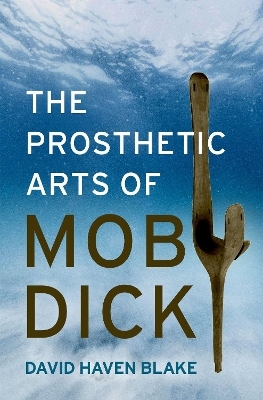
The Prosthetic Arts of Moby-Dick
Seiten
2025
Oxford University Press Inc (Verlag)
978-0-19-778051-0 (ISBN)
Oxford University Press Inc (Verlag)
978-0-19-778051-0 (ISBN)
- Noch nicht erschienen (ca. Februar 2025)
- Versandkostenfrei
- Auch auf Rechnung
- Artikel merken
The Prosthetic Arts of Moby-Dick offers the first book-length study of how disability shapes one of the world's most iconic novels. Rather than see Ahab's lost limb as a deficiency, it explores the way that his prosthesis becomes both a means to power and a key figure for understanding the role that Islamic cultures plays in the novel's plot and form.
The Prosthetic Arts of Moby-Dick is a meditation on wounding, disability, and the representation of Islam in U.S. narratives of aggrievement. It offers the first book-length study of how disability shapes one of the world's most iconic novels. For generations, readers have viewed Captain Ahab's whalebone leg as a symbol of what he lacks, the limb he lost while fighting the white whale off the coast of Japan. David Haven Blake considers that ivory leg in a historical, medical, and geo-political context. Drawing on extensive archival research, the book situates Ahab's prosthesis at the center of the novel's reflections on wounding, embodiment, and the role that Islamic cultures play in American narratives of revenge.
Melville had a lifelong interest in dismemberment. From the use of assistive devices to the phenomenon of phantom limbs, he keenly imagined the experience of disability on ship. Sawed from a sperm whale's jaw, Ahab's artificial leg helps him stand, walk, and fight. But the prosthesis that marks him as different also marks the foundation of the Pequod's community.
Blake connects the novel's interest in prostheses with the use of Islamic imagery in 19th-century America to characterize overwhelming power. In this radically new analysis, he identifies the character Fedallah as the captain's most important prosthesis, as the hair-turbaned soothsayer pilots the captain to his final battle with Moby Dick. A key to understanding both Ahab and Ishmael, Fedallah may be the crutch upon which this novel of dismemberment leans.
The Prosthetic Arts of Moby-Dick offers a reading of Melville's greatest work that is both striking and distinct. Elegantly written and spanning each stage of Melville's career, the book meditates on democracy, aggrievement, and the challenges of living in a global age.
The Prosthetic Arts of Moby-Dick is a meditation on wounding, disability, and the representation of Islam in U.S. narratives of aggrievement. It offers the first book-length study of how disability shapes one of the world's most iconic novels. For generations, readers have viewed Captain Ahab's whalebone leg as a symbol of what he lacks, the limb he lost while fighting the white whale off the coast of Japan. David Haven Blake considers that ivory leg in a historical, medical, and geo-political context. Drawing on extensive archival research, the book situates Ahab's prosthesis at the center of the novel's reflections on wounding, embodiment, and the role that Islamic cultures play in American narratives of revenge.
Melville had a lifelong interest in dismemberment. From the use of assistive devices to the phenomenon of phantom limbs, he keenly imagined the experience of disability on ship. Sawed from a sperm whale's jaw, Ahab's artificial leg helps him stand, walk, and fight. But the prosthesis that marks him as different also marks the foundation of the Pequod's community.
Blake connects the novel's interest in prostheses with the use of Islamic imagery in 19th-century America to characterize overwhelming power. In this radically new analysis, he identifies the character Fedallah as the captain's most important prosthesis, as the hair-turbaned soothsayer pilots the captain to his final battle with Moby Dick. A key to understanding both Ahab and Ishmael, Fedallah may be the crutch upon which this novel of dismemberment leans.
The Prosthetic Arts of Moby-Dick offers a reading of Melville's greatest work that is both striking and distinct. Elegantly written and spanning each stage of Melville's career, the book meditates on democracy, aggrievement, and the challenges of living in a global age.
David Haven Blake is Professor of English at The College of New Jersey. He is the author of Walt Whitman and the Culture of American Celebrity and Liking Ike: Eisenhower, Advertising, and the Rise of Celebrity Politics, winner of the 2017 PROSE Award for the year's best book in Media & Cultural Studies.
| Erscheint lt. Verlag | 27.2.2025 |
|---|---|
| Verlagsort | New York |
| Sprache | englisch |
| Maße | 156 x 235 mm |
| Themenwelt | Geisteswissenschaften ► Sprach- / Literaturwissenschaft ► Anglistik / Amerikanistik |
| Geisteswissenschaften ► Sprach- / Literaturwissenschaft ► Literaturgeschichte | |
| Geisteswissenschaften ► Sprach- / Literaturwissenschaft ► Literaturwissenschaft | |
| ISBN-10 | 0-19-778051-2 / 0197780512 |
| ISBN-13 | 978-0-19-778051-0 / 9780197780510 |
| Zustand | Neuware |
| Haben Sie eine Frage zum Produkt? |
Mehr entdecken
aus dem Bereich
aus dem Bereich
Poetik eines sozialen Urteils
Buch | Hardcover (2023)
De Gruyter (Verlag)
CHF 83,90
Buch | Softcover (2024)
belleville (Verlag)
CHF 27,95


